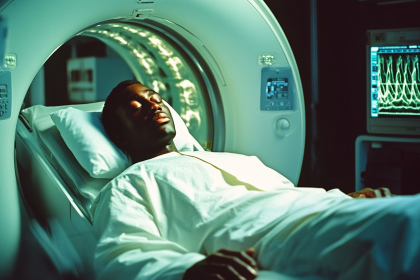You’re sitting at your computer when it starts — that annoying flutter in your eyelid that feels like a tiny butterfly trapped under your skin. Most of the time, eye twitching is harmless and goes away on its own. But sometimes, that persistent twitch can be your body’s way of telling you something more serious is going on.
Understanding when to worry about eye twitching could help you catch health problems early, before they become bigger issues.
Stress and sleep deprivation create the perfect storm
The most common culprits behind eye twitching are stress and exhaustion. When you’re running on empty, your nervous system becomes hypersensitive, causing muscles to fire randomly. Your eyelid muscles are particularly susceptible because they’re delicate and constantly in use.
Chronic stress floods your body with cortisol and adrenaline, which can make muscles throughout your body more reactive. Combined with poor sleep, this creates the perfect conditions for those annoying eyelid spasms.
If your eye twitching coincides with stressful periods at work, relationship problems, or major life changes, stress management techniques like meditation, exercise, or therapy might help more than any medical treatment.
The good news is that stress-related twitching usually resolves once you address the underlying stressors and get adequate rest.
Caffeine overload affects more than your energy
That extra cup of coffee might be doing more than keeping you awake — it could be causing your eye to twitch. Caffeine is a stimulant that affects your entire nervous system, including the tiny muscles around your eyes.
Too much caffeine makes your muscles more excitable and prone to spasms. If you’ve recently increased your coffee intake, started drinking energy drinks, or switched to a stronger brew, your twitching might be directly related.
Try cutting back on caffeine gradually and see if your symptoms improve. Many people find that reducing their daily intake by just one cup makes a noticeable difference in muscle twitching.
Nutritional deficiencies your body can’t ignore
Your muscles need specific nutrients to function properly, and deficiencies can show up as twitching and spasms. Magnesium deficiency is particularly common and directly affects muscle function and nerve transmission.
Potassium deficiency can also cause muscle problems, including eye twitching. This is more likely if you’re not eating enough fruits and vegetables or if you’ve been sweating excessively from exercise or hot weather.
Vitamin D deficiency, which affects millions of people, can contribute to muscle weakness and spasms throughout the body, including the delicate muscles around your eyes.
A simple blood test can check for these deficiencies, and addressing them through diet or supplements often resolves twitching within a few weeks.
Eye problems that trigger protective responses
Sometimes eye twitching is your body’s response to irritation or injury in the eye itself. Dry eyes are incredibly common, especially for people who spend long hours looking at screens or live in dry climates.
When your eyes don’t produce enough tears or the tears evaporate too quickly, your eyelids may twitch as a protective response. This twitching often comes with other symptoms like burning, grittiness, or blurred vision.
Conjunctivitis (pink eye) can also cause twitching along with redness, itching, and discharge. Even minor corneal scratches from dust, contact lenses, or rubbing your eyes can trigger protective muscle spasms.
These eye-related causes usually improve once you treat the underlying condition with artificial tears, eye drops, or other appropriate treatments.
Neurological red flags you shouldn’t ignore
While most eye twitching is benign, persistent or severe twitching can sometimes indicate neurological problems. Benign essential blepharospasm causes involuntary muscle contractions around both eyes and can progress to functional blindness if untreated.
Hemifacial spasm typically affects only one side of the face, causing twitching that can spread from the eyelid to other facial muscles. This condition often results from blood vessels pressing on facial nerves.
Multiple sclerosis can present with eye twitching as one of its early symptoms, often accompanied by vision problems, muscle weakness, or coordination difficulties. While this is rare, persistent twitching combined with other neurological symptoms warrants medical evaluation.
When screen time becomes a health hazard
Digital eye strain affects millions of people who spend hours daily looking at computers, phones, and tablets. This constant focus on close objects strains the muscles around your eyes and can trigger twitching.
The blue light from screens and reduced blinking while concentrating can also contribute to dry eyes, which then leads to twitching. The 20-20-20 rule helps: every 20 minutes, look at something 20 feet away for 20 seconds.
Adjusting screen brightness, using artificial tears, and taking regular breaks can significantly reduce eye strain and associated twitching.
Medication side effects hiding in plain sight
Certain medications can cause muscle twitching as a side effect, including some antidepressants, antihistamines, and medications for high blood pressure. If your twitching started shortly after beginning a new medication, this could be the culprit.
Don’t stop taking prescribed medications without consulting your doctor, but do mention the twitching at your next appointment. Often, adjusting the dose or switching to a different medication can resolve the problem.
Red flags that mean see a doctor now
Most eye twitching resolves on its own within days or weeks, but certain symptoms require immediate medical attention. Seek help if your twitching lasts more than a few weeks, affects other parts of your face or body, or is severe enough to completely close your eye.
Twitching accompanied by vision changes, muscle weakness, facial drooping, or difficulty speaking could indicate serious neurological problems requiring urgent evaluation.
Any sudden onset of severe twitching, especially if it’s different from anything you’ve experienced before, should be evaluated promptly.
Taking control of your eye health
While eye twitching can be annoying, it’s usually your body’s way of telling you to slow down, reduce stress, or address minor health issues. Pay attention to patterns — does it happen when you’re stressed, tired, or have been drinking too much coffee?
Simple lifestyle changes like managing stress, getting adequate sleep, reducing caffeine, taking screen breaks, and maintaining good nutrition can prevent most episodes of eye twitching.
But don’t ignore persistent or severe symptoms. Your eyes are precious, and any concerning changes deserve professional evaluation to ensure you’re not missing something important that needs treatment.
















